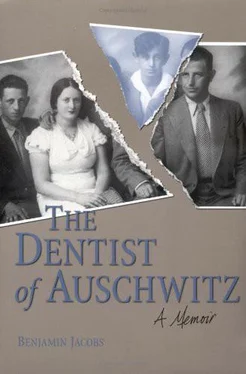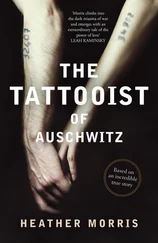The Racias (roundups) followed. Jews were gathered and ordered to do demeaning labor. One day Pola was seized and taken to the German army barracks. There she was made to clean privies. “It’s a pity that a pretty girl like you has to be Jewish,” one soldier wisecracked, as the others laughed. Pola came home trembling. “I would rather die,” she said, “than go through this again.”
Pola and I decided to escape into the Soviet-occupied part of Poland. Although our parents weren’t in favor of this, they recognized that, in circumstances like these, everyone had to make a personal decision. It was late December, almost New Year’s, when we left. It was cold enough for a heavy snowfall that morning, but no snow had fallen. We removed our yellow patches from our clothes and hoped to pass for non-Jews. To be less conspicuous, we took only necessities. After exchanging farewells with the rest of our family, we left. The air was raw. A white frost blanket covered the fields, and the streams were frozen. We trekked through the forests on our fateful odyssey.
Four hours later we reached the train station. It was the end of the first leg of our journey. We had several hundred kilometers to go. Pola, a light-haired brunette with non-Semitic features, had no difficulty buying the tickets to a town near the Russian border. Then we sat and waited for the train to arrive. We spotted more Jews who had the same intention in the waiting area. We didn’t talk to anyone for fear of being recognized. When the train finally arrived and we thought we had made it, we were stunned to hear an announcement: Jews were restricted from using the train. All others could board it. Somehow the SS men knew that Jews were among the travelers.
A dozen of us who remained on the platform looked on as the train chugged away and slowly disappeared. Then two SS men collected our papers and stamped a J on them. Before returning them to us, they issued an angry warning. “Whoever tries to use the trains again will be shot.” Our plans ruined, we felt crushed. We had little choice but to return home.
Although our family shared our disappointment, they were happy to have us back. Papa, as always, found a silver lining. “Whatever happens to us, we’ll at least be together,” he said. Then he added a contention he had often used. “Things are never eaten as hot as they’re cooked!”
A few weeks later one of my sister’s friends returned disappointed from the Soviet-occupied part of Poland. He warned us not to go there. “The Russians have been rounding up the Jews that came over and deporting them to labor camps in Siberia,” he said. We could not imagine why the Soviets were also our enemies. It shattered our idea about Jews being seen as equal to others under communism.
Because my grandfather was constantly harassed in the street about his beard, he stopped going out. Removed from his friends, he grew weak. One morning we were shocked to find him in a deep sleep from which he never awoke. My idol was dead. We knew that Grandpa had died because he lost his will to live. I understood that with him gone, my life would never be the same. The procession to the cemetery consisted of only the family, as others were forbidden to attend. All the mirrors in our house were covered, and we sat shivah for a week. Friends, at risk to themselves, came to make up the ten-man prayer service. I overheard them saying that they envied my grandfather for his peaceful death.
A few days later Mother and I took a back road to the other side of the village. Halfway there, I noticed a former classmate of mine coming toward us. Like many of the others of German ancestry, he too had joined the Nazis. He wore a brown shirt with a red Hakenkreuz (swastika) armband. Presenting himself as a German, he sought to demonstrate his faithfulness to the Führer. Coming upon us, he pushed my mother, and she fell to the ground.
I was shocked. I searched his face. “Otto, why are you doing this?” I demanded, outraged. In his eyes I saw sinister cruelty and mercilessness. The schoolmate of yesterday was a foe today.
Then he began to use the common Nazi hate rhetoric. “You Jew swine, you pests, you war criminals.”
I could see that he knew who we were, but he showed no remorse. He left us, still mumbling with enmity. My blood pounded in my temples. I thought that I should have ripped the swastika off his arm, but I was paralyzed, as if I had no command over my limbs. Pale and humiliated, Mama could not stop trembling, but fortunately she was not hurt. I could not comfort her. I had not defended her, and I felt a deep guilt. This incident convinced me how quickly people’s minds could be poisoned. This was a bad year, and the next one might be worse.
CHAPTER V
The Ghetto in Dobra
Greed for Jewish booty lured many followers to Hitler. Little by little, without pretense or restraint, the Nazis had taken our homes, our possessions, our hope, and our pride. And though each downward spiral seemed to take us to the lowest state imaginable, we were to learn that this abyss had no bottom.
In the spring of 1940 we were ordered out of our house. We were the only Jewish family in the vicinity. Everything of ours—business, house, and land—was given to Anders, a Volksdeutscher who was a former worker of ours. His only credential was his heritage. The Judenrat then assigned us an attic room across the street in what was once a school. We were allowed to take one armful of possessions. Pola sneaked across to our house once more and rescued a few of her favorite books. Unsuited to running any business, Anders closed its doors shortly afterward. Nothing caused my mother more pain than looking down on her home, which now seemed so alien.
The third-floor attic room, once used for storage, became our living quarters. Pola, Josek, and I slept on straw pallets on the floor. Mama and Papa had two cots. We hung blankets to create privacy.
We continued to observe the Shabbat. Each Friday evening Mama lit candles and recited the prayer. Papa, acting as if not much had changed, kept saying, “Nothing is lost. It’s all only temporary. When the war is over we’ll move back to our house, and everything will be as before.”
At the end of March 1940 the birds returned. Nature was taking its course early that year. On one sunny day, as I stood in the school yard, five Germans in army uniforms rounded the corner of the school. This was odd, I thought. What could they want? No one except the former caretaker and ourselves lived in the schoolhouse. As the Germans walked toward me, a corporal, their leader, sternly asked if I was Bronek Jakubowicz.
“Yes,” I said.
“You are under arrest.”
I thought surely that it was a mistake. “Are you sure that you want me?” I asked. “Why? What have I done?”
“You’ll find out later. Come with us.”
Although I knew it was unmistakable, I still couldn’t understand why they were arresting me, or why they needed five soldiers to do it. Mama and Pola had heard the commotion. They came down to the yard and, startled, gasped. “Why are you arresting my son? What do you want of him?” Mama asked.
“He is coming with us,” one soldier bellowed, ordering me to move.
“Wait, let me at least bring down his jacket,” my mother pleaded.
“He won’t need it. He is going to be shot,” the corporal grumbled back at her. Mama nearly fainted. She covered her face, as my sister held on to her.
I followed them out of the yard, one soldier on each side, two behind, and the corporal ahead of us. That aroused the neighbors, and they came out and looked. I had lived in this village since I was born, and nearly everyone knew me. They couldn’t understand why I had been arrested and was being led away by five soldiers. In spite of my fear, I held my head high like a character in a Shakespearean play. It was a long way. I was led to the other end of the village, into the army headquarters and Schweikert’s residence. In the yard, against a barracks wall, soldiers with rifles in hand guarded four other men. The corporal waved to me to join them.
Читать дальше












